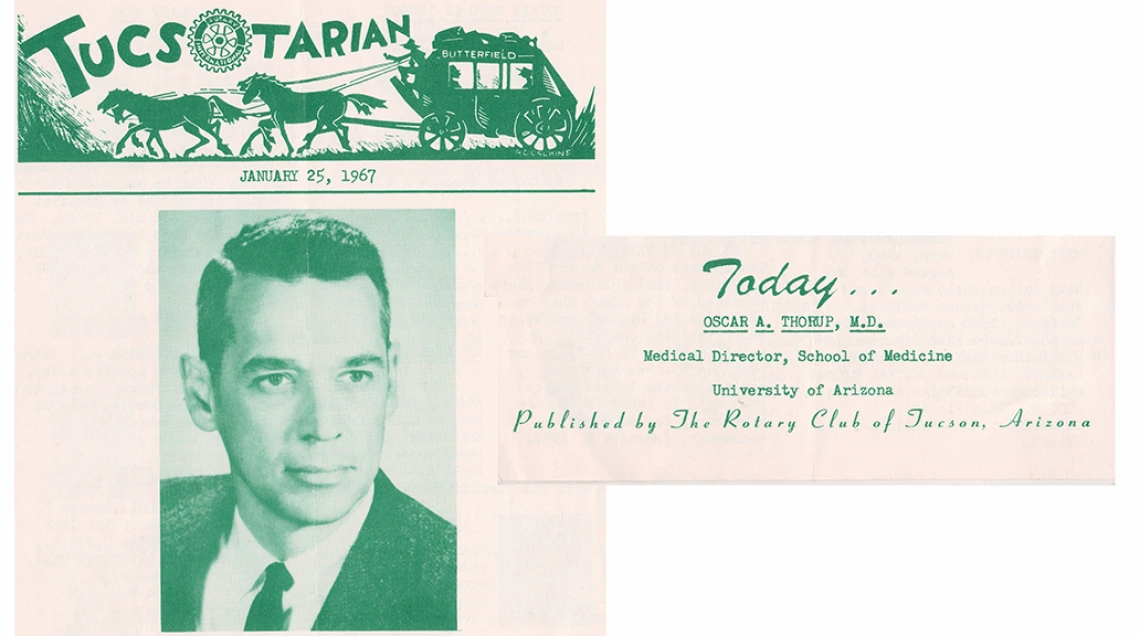Oscar Andreas Thorup, Jr. papers

Dr. Oscar A. Thorup, Tucsotarian newsletter, Rotary International, 1967 (Box 7, Folder 7)
Collection dates: 1965-1979 bulk (bulk 1966-1976)
Collection contains correspondence, annual reviews, reports, plans, and proposals relating to the early years of University of Arizona College of Medicine. Topics range from facilities planning and construction, curriculum, faculty promotion and tenure, clinical issues and hospital administrative matters. This collection is part of the Arizona Health Sciences Library (AHSL), a collection that focuses on the University of Arzona College of Medicine. It was transferred to Special Collections in 2018. Formerly collection number HT 0017.
Oscar A. Thorup Jr., MD, was one of the founders of the University of Arizona College of Medicine. In 1966, Dr. Thorup joined the UA’s future medical school as professor and chairman of the Department of Medicine. Working with Merlin K. “Monte” DuVal, MD, and Philip Krutsch, MD, they formed a three-man planning team to develop the UA College of Medicine. Over the next four years, they worked closely with architects while concurrently developing the curriculum for the incoming medical students.
Recalling his first meeting with Dr. Thorup, Dr. DuVal notes, “Starting a medical school from scratch didn’t seem like a big deal when I said I’d do it, but once I had accepted the invitation - and actually arrived on the scene I knew I was over my head. That is, until I met Oscar Thorup. It was almost 40 years ago. I was looking for a really good internist, broadly oriented, and ready to set a tone for the institution we were developing. My list of candidates was strong but they all paled once I had met Oscar. My problem was how to persuade him to leave his beloved Charlottesville. Fortunately, he rose to the challenge and moved to Arizona.”
During his tenure at the UA College of Medicine, Dr. Thorup spent a second sabbatical in Oxford, England in 1972, with Dr. Alan Sharp, again focusing on the problems of blood coagulation. Upon his return to Arizona, he resumed his post as chairman of the Department of Medicine. In 1974, Dr. Thorup was invited to initiate a new program in continuing education at the University of Virginia. He was made director of the Program of Human Biology and Society, and together with Dr. James Childress began a new medical ethics program. Dr. Thorup also headed the Medical Center Hour, the medical school's weekly public conference on current cultural and ethical issues related to health care. Many of these programs were subsequently published as articles in PHAROS. Dr. Thorup retired in 1989, as Professor Emeritus of Medicine.
During his nine years in Tucson, Dr. Thorup served on many civic committees, including the Hospital Planning Council for Greater Tucson, the Arizona Heart Association, the Southern Arizona Heart Association, and the Pima County Medical Society. He served on the board of directors of the local chapter of the American Red Cross and as chairman of the Planning and Allocation Committee of the Tucson Community Council (United Way). Additionally, Dr. Thorup held several leadership positions on the Tucson Health Planning Council (board member, executive committee, and president). Dr. Thorup co-authored five editions of Fundamentals of Clinical Hematology with Dr. Byrd S. Leavell and authored numerous articles published in a variety of medical and scientific journals. Dr. Thorup was particularly interested in Thomas Jefferson and spent many years researching and writing about his life and interest in medicine. Dr. Thorup died after a long illness and courageous battle, Oct. 21, 2002 at the University of Virginia Medical Center in Charlottesville, Va.
A collection guide explains what's in a collection. New to using our collections? Learn how to use a collection guide.
Collection guideAccess this collection
Visit us in person to access materials from this collection. Our materials are one-of-a-kind and require special care, so they can’t be checked out or taken home.
How to cite
Learn how to cite and use materials from Special Collections in your research.
